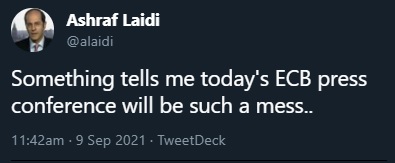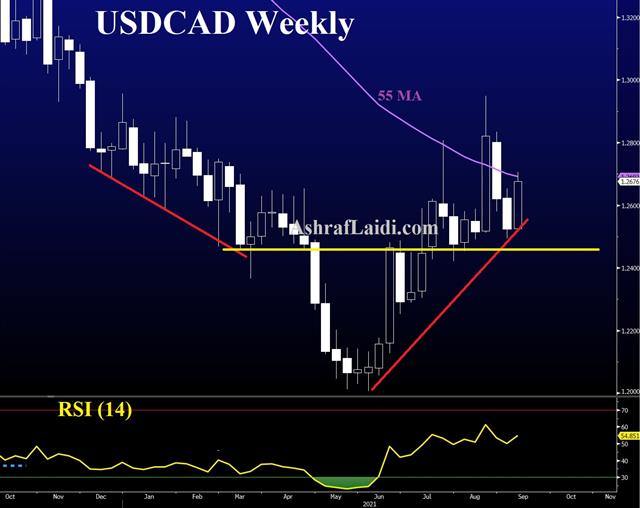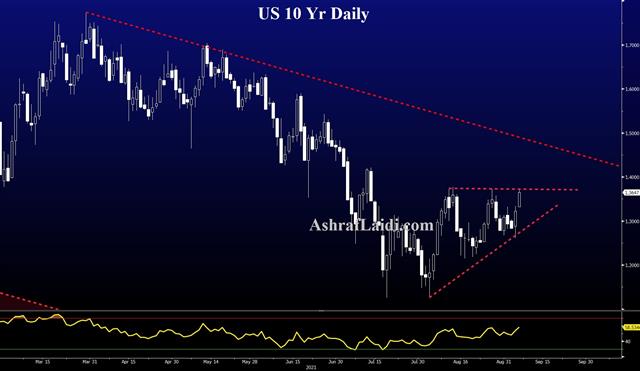Intraday Market Thoughts Archives
Displaying results for week of Sep 05, 2021ECB Baby Taper, Bonds Bid

The ECB announced a 'moderately lower' pace of PEPP purchases as they work towards managing the envelop towards the program's end in March. The initial reaction was euro strength but it soon gave back the move and turned lower. That as compounded as Lagarde emphasized transitory inflation and left hints that more APP buying could replace the PEPP if necessary.
The ECB President clearly didn't want this viewed as a hawkish move and the bond market reaction showed that she was successful. Bund yields fell to -0.369% from 0.325% beforehand.
Still, there was good news for the eurozone as the 2021 GDP forecast was boosted to 5.1% from 4.6% with the 2022 estimate left nearly unchanged. That forecast puts the economy back at pre-pandemic levels before year end.
This week we had central bank decisions from the ECB, BOC and RBA. They followed a pattern where the market largely tuned out.
This could be a sign that at the forefront of trading are more global issues like inflation, problems with supply bottlenecks, labor shortages and China's common prosperity push. We sympathize with that thinking as those global macro themes are likely to overwhelm central bank tweaks.
On the employment front, Thursday's release of US jobless claims fell to a post-pandemic low of 310K from 344K. On Friday, it will be Canadian jobs in focus and they're expected at +100K in August after a +94K reading in July. Macklem, in his Thursday speech maintained a determined tone around an October taper but said it will depend on economic data. The jobs report will be a big factor in that.Here Comes the ECB

What Lagarde may try to engineer is a more-flexible APP program to fill in the gap, and maintain the current level of easing. Such strategy risks a multitude of communications errors, that could boost the euro and bund yields.
Today's meeting is particularly fraught because ECB communication is likely to emphasize better-than-anticipated economic performance and new inflation challenges.
A further problem is brewing around year end when the Fed tapers its purchases. That will push up global yields and tighten European financial conditions. It may put the ECB back in a position to ease further, something that could compound euro losses.
For now though, the combination of inflation, economic growth and the reduction of the PEPP are all euro positives and $1.1940/50 should be back in play. Lagarde will be cognizant of that though and may try to balance it with layers of jawboning.What Will the BoC Signal?

The BOC has led markets to believe it will taper every second meeting; so after tapering to $2 billion from $3 billion in July, today's meeting is expected to be a non-event meeting.
Nonetheless, this is an opportunity for Macklem to pre-emptively hint that a taper isn't coming in at the October 27 meeting, or put that squarely on the table. However the reasons for doing that are outweighed by the reasons to wait and see.
The main negative developments since July have been the delta wave in the US and the major disappointment in Q2 Canadian GDP along with the July preliminary estimate. A major drag has come from slower housing sale activity and lower exports due to automotive bottlenecks – two issues that are likely to persist.
At the same time, Canadian vaccination rates are high and the current reopening outlook is good. Perhaps most importantly, Canada is two weeks away from an election and emphasizing a slowdown and halting the taper could be viewed as political meddling.
The most likely outcome is that the BOC highlights renewed uncertainty but maintains the already-vague guidance on QE, which says that “decisions regarding further adjustments to the pace of net bond purchases will be guided by Governing Council's ongoing assessment of the strength and durability of the recovery.”
Given Monday's dump in the loonie, that might be enough to draw a line under the currency for now. Note though that Macklem will also speak on Thursday and could fine-tune the message then.
In the bigger picture, the Canadian dollar was caught in a broad USD bid on Monday as Treasury yields rose. There are a number of theories on why yields have pushed up since non-farm payrolls but one is simply that it's a concession ahead of supply. $58B three-year notes were sold Tuesday, $38B of 10s are coming Wednesday and $24B of 30s are due Thursday. If demand is strong, the trend higher in yields could be short-lived.
RBA & Boris Johnson Reversal from Covid

The best-laid plans in all walks of life have been derailed by covid in the past 18 months. This is the case for Boris Johnson's tax policy and the RBA's monetary policy. The latter had explicitly outlined a taper, but lockdowns with no end are reshaping the path of the economy along with the same bottlenecks that are weighing everywhere.
RBA QE is running at $5 billion per week and a month ago there was a strong consensus they would lower that to $4 billion. 10 of 16 economists told Bloomberg they were expecting a delay in the taper. There was uncertainty after stronger than expected employment figures, but persistent warnings of an economic slowdown owing to the lockdowns took priority. Compounding the downside risk is the rapid recent run-up and potential for consolidation.
Longs in EURGBP, USDCAD and shorts in AUDJPY appear to be sensibe trading ideas.






